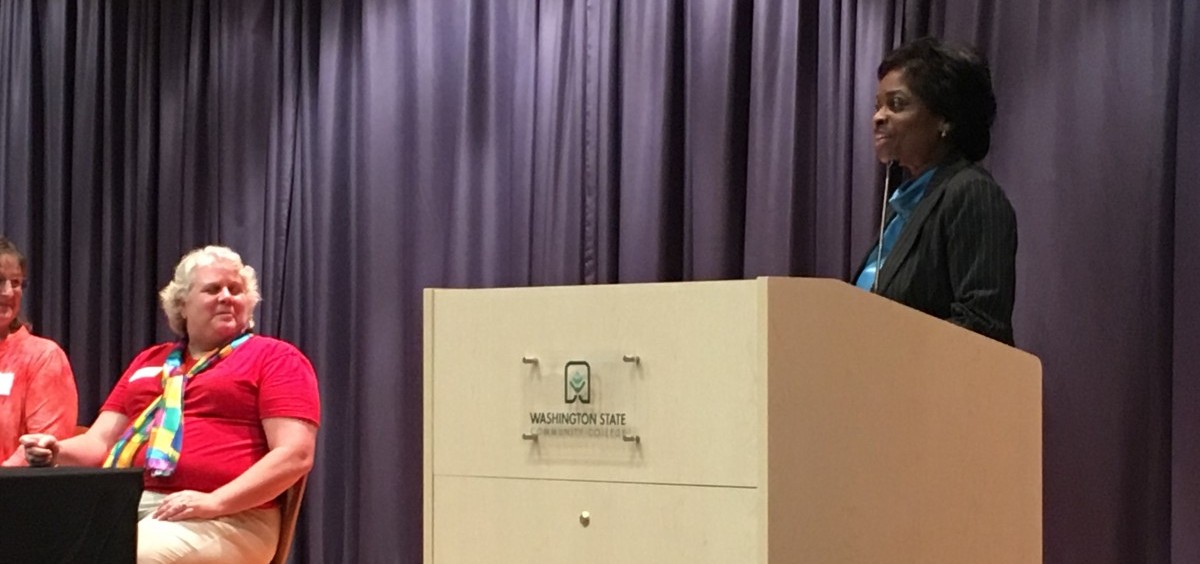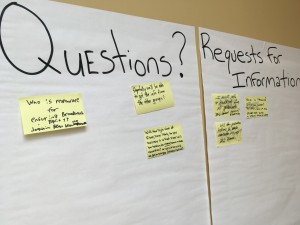News

Rural Broadband Access: Summit Seeks To Connect Leaders
By: Susan Tebben
Posted on:
MARIETTA – Southeast Ohio residents like Julie Pepper, don’t want to use broadband access for Netflix or gaming, as is commonly argued by those that don’t see broadband access as a priority for rural communities.
As a postal worker in Morgan County, Ohio, she sees broadband access in the same way she sees her job as a postal worker.
“The Post Office was established to bind the nation together, and I believe that broadband will help bind the nation together as the Post Office did,” Pepper said.
That’s why she and hundreds of others attended the Appalachian Ohio-West Virginia Connectivity Summit at Washington State Community College on Tuesday.
She joined with county officials from Ohio, West Virginia and Kentucky, along with broadband experts and Washington, D.C., advocates promoting better internet accessibility in rural areas.

Susan Tebben / WOUB News
The summit was created by community organizer and Meigs County resident Liz Shaw and the Citizens Connectivity Council. Her goal was not necessarily to see immediate action, but to show the strong desire for access and the currently sad state of broadband in Appalachia.
“We’re not only not going forward, we are going backward in many cases,” Shaw said. “This is like being in a Conestoga wagon on the prairie and sending up smoke signals, in my opinion, when you hear from a county that has no 911 and no landlines and no cell phone and no internet working.”
Kate Forscey, associate policy counsel at Public Knowledge, a Washington, D.C., digital rights advocacy group, said the summit was a good time for national groups to hear from the region.
“This is an opportunity for localities to be empowered, to provide their own broadband, to talk about the challenges that they face that we don’t necessarily always hear about in Washington,” Forscey said.
Many people at the summit wanted to tell their struggles to Federal Communications Commissioner Mignon Clyburn, who conducted hearings with counties and listened during a town hall meeting on Tuesday evening.
“I am especially moved and troubled about what I heard today,” Clyburn told WOUB. “There are certain problems that I thought we had addressed, that we’d moved beyond.”
Clyburn was struck particularly about basic voice and mobile services, which she called “fundamental problems that we have yet to address.”
While there were plenty of stories of struggle, some summit attendees brought stories of success and ongoing progress.
“Our county, like most counties in Appalachia, has been hit hard by the downturn in the coal economy,” said Roland Brown, of Letcher County, Kentucky. “Our county-judge executive…he sees broadband as an economic driver.”
Last February, the Letcher County Broadband Board was created after the judge-executive, Kentucky’s equivalent of a mayor, asked for volunteers to join the board.
“They had over 40 people that called and wanted to be on the board, because people are starting to understand broadband’s important,” said Brown, who now sits on the board.
In the first phase of Letcher County’s project to bring broadband access to the mountainous area, 55 miles, including 490 homes, are part of the connection plan. The phase is estimated to cost $2.5 million. Brown and the board are hoping to bring connections to every home possible.
But the matter of how to regulate the broadband access as more communities get connected was part of the discussion as well.
Bill Callahan, director of Connect Your Community, a nonprofit focusing on low-income houses and the digital divide, said Ohio legislators decided two different times that cable companies should not be regulated by municipalities, state authorities, or by the Public Utilities Commission of Ohio (PUCO).
The first issue in making broadband a priority for communities, Callahan said, is for “some level of government have some say.”
But even with government say, corporate cable companies still will most likely not be put under the jurisdiction of an entity like PUCO. But there’s a more important issue at hand, officials said at the summit.
“I’m not seeing AT&T going back under PUCO regulation, whereas I am seeing a lot of communities getting creative,” Callahan said.
WOUB’s live coverage of the event can be found here:
Continuation of Town Hall Meeting
You can read more about Letcher County’s broadband project in this story by Ohio Valley Resource’s Benny Becker.
Aaron Payne contributed to this report.

